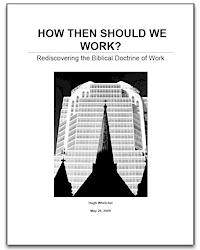How Then Should We Work? Rediscovering the Biblical Doctrine of Work
 The arena was packed with over 5,000 business people attending a one day motivational conference to listen to some of today’s greatest inspirational speakers including, General Colin Powell, Dick Vitale and Tony Robbins. One of the speakers began by asking the following question, “If you went home tonight and found that a long lost relative had died and left you $10,000,000 would you be at work tomorrow?” An audible “NO” rang out from the audience.
The arena was packed with over 5,000 business people attending a one day motivational conference to listen to some of today’s greatest inspirational speakers including, General Colin Powell, Dick Vitale and Tony Robbins. One of the speakers began by asking the following question, “If you went home tonight and found that a long lost relative had died and left you $10,000,000 would you be at work tomorrow?” An audible “NO” rang out from the audience.
Their sentiment is shared by many in our country today. A recent Gallup poll found that 77% of Americans hate their jobs. Another found Americans hate their jobs more today than in the past 20 years; fewer than half say they’re satisfied with their current job.2 With 50-hour plus work weeks and long commutes, workers are spending more and more of their lives at work, yet so many of them are unfulfilled and frustrated with their jobs. This is also true for many Christians for whom work often seems only a “means to an end.”
Christians today have bought into the pagan notion that leisure is good and work is bad. They have also been mislead by the sacred/secular distinction which teaches that only working in the church is “real” fulltime Christian service. This has not always been the case. The Reformers taught that all labor accepted as a calling and performed “as unto the Lord” was noble, yet this truth has slipped dramatically both in today’s Church and our present culture.
 Click on the link below to read the article “How Then Should We Work? Rediscovering the Biblical Doctrine of Work,” written by Hugh Whelchel, Executive Director of the Reformed Theological Seminary campus in Washington D.C.
Click on the link below to read the article “How Then Should We Work? Rediscovering the Biblical Doctrine of Work,” written by Hugh Whelchel, Executive Director of the Reformed Theological Seminary campus in Washington D.C.
The link below will take you to the PDF version of the article (Acrobat Reader Required), which is posted on the RTS website.
Click here to read How Then Should We Work.pdf
